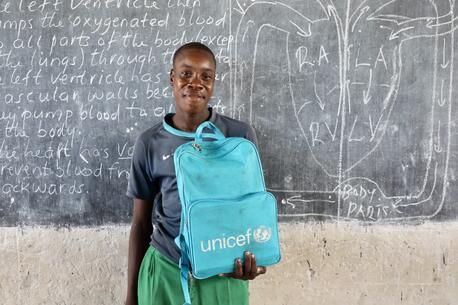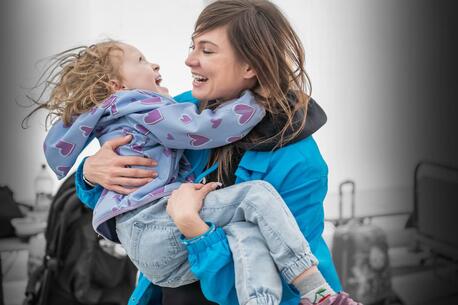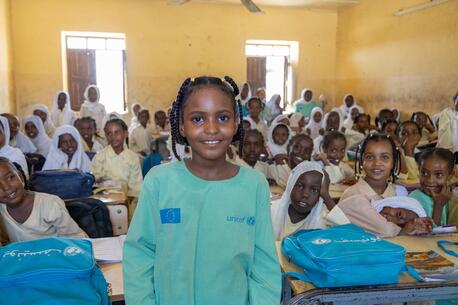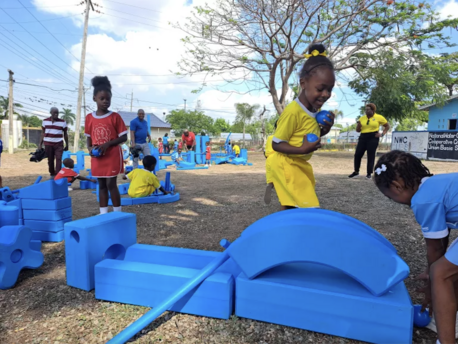
Harnessing the Power of Play With Building Blocks
Simple blocks open doors to creative play for young children in Jamaica, building connections, skills, resilience, relationships and more.
Children learn best through play
Pirate ships, bridges, flowers, dinosaurs, cars, castles, trains, tents, campfires, palm trees and house. What do they have in common?
A child’s imagination, sparked by block play.
With UNICEF support, children across Kingston, Jamaica have been exercising their creativity and critical thinking skills along with life skills like patience and teamwork, while playing with a set of big, blue blocks. Block play may look simple, but the impact on sensory, motor and intellectual development can be profound.
Block play involves focus, social interaction, problem-solving, the use of math concepts and vocabulary skills, along with spatial awareness.
I made a pirate ship because I read about it in books. I made a sword too! — 7-year-old Sahria in Kingston, Jamaica
“I made a pirate ship because I read about it in books. I made a sword too!” exclaimed 7-year-old Sahria, describing her Imagination Playground experience, part of a collaborative effort between Project Star and UNICEF at a summer camp at Highholborn Street Basic School. Project Star is a social and economic transformation initiative of the Private Sector Organization of Jamaica (PSOJ).
The oversized blocks are central to the Imagination Playground movement. This innovative mobile system transforms any space into a playground — indoors or outdoors. Children of all ages direct their own play and explore ways to control and shape the big world around them by interacting with large foam blocks of various shapes and sizes — cubes, bricks, cogs, curves and cylinders — that fit together. Houses, ships and cars emerge along with flowers, palm trees and campfires — whatever young minds can imagine.
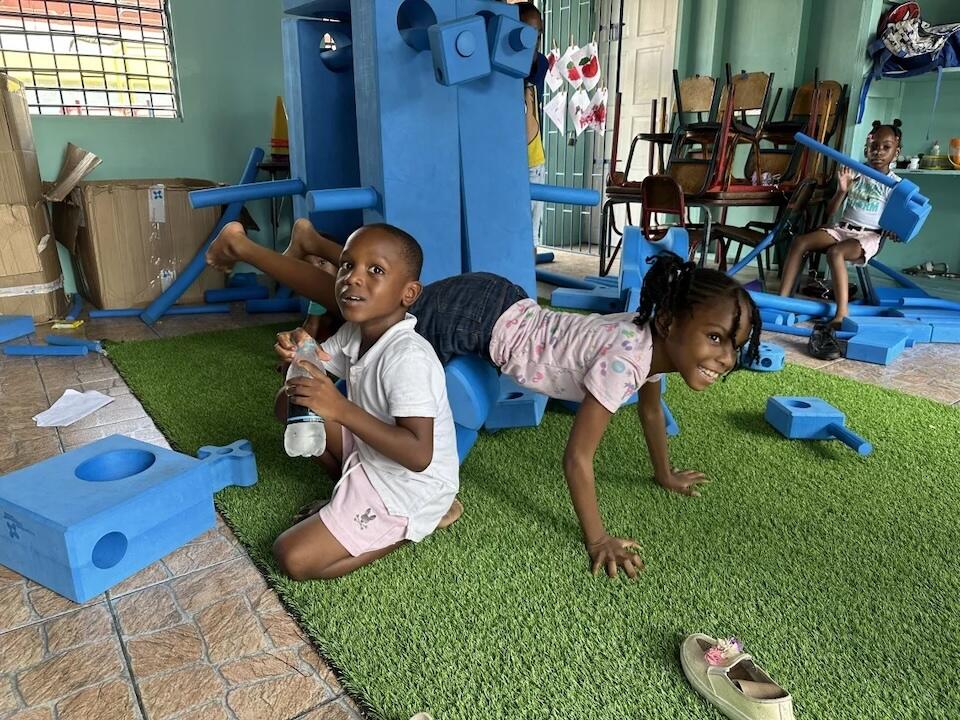
Play is the work children do, a fundamental part of their developmental process
Play is how children learn to navigate the world and build narratives, knowledge and social skills. More time playing means more time engaging the imagination, relaxing and having fun while developing the resilience, independence, confidence and coping mechanisms needed to thrive in a constantly changing world. Play can also be a form of much-needed psychosocial support, helping to relieve stress and anxiety and mitigating the effects of violence and other traumatic experiences.
Every child has the right to rest, relax, play and take part in creative activities. UNICEF is committed to facilitating safe spaces to play for families and communities around the world. In Jamaica, work continues with the Ministry of Education and Youth to structure regular and increased access to the Imagination Playgrounds and to advocate for the inclusion of play in the build-out of “pocket parks” and other similar spaces around the island.
At home, while wooden blocks are durable and aesthetically pleasing, blocks can be upcycled from many different items including shoe boxes, paper towel and toilet paper rolls, cereal boxes and soap boxes as well as regular cardboard boxes of various shapes and sizes. Cardboard blocks can also be made by cutting pieces and gluing them together.
Play also helps parents and children connect. Buy or make blocks, use Legos if you have them and have a block party! Discuss what you made together and why. The possibilities of combining the blocks and the ensuing conversations are virtually limitless. Remember, block play is anything but basic; it’s complex in the best kind of way because you control what you create. Those skills and memories are priceless.
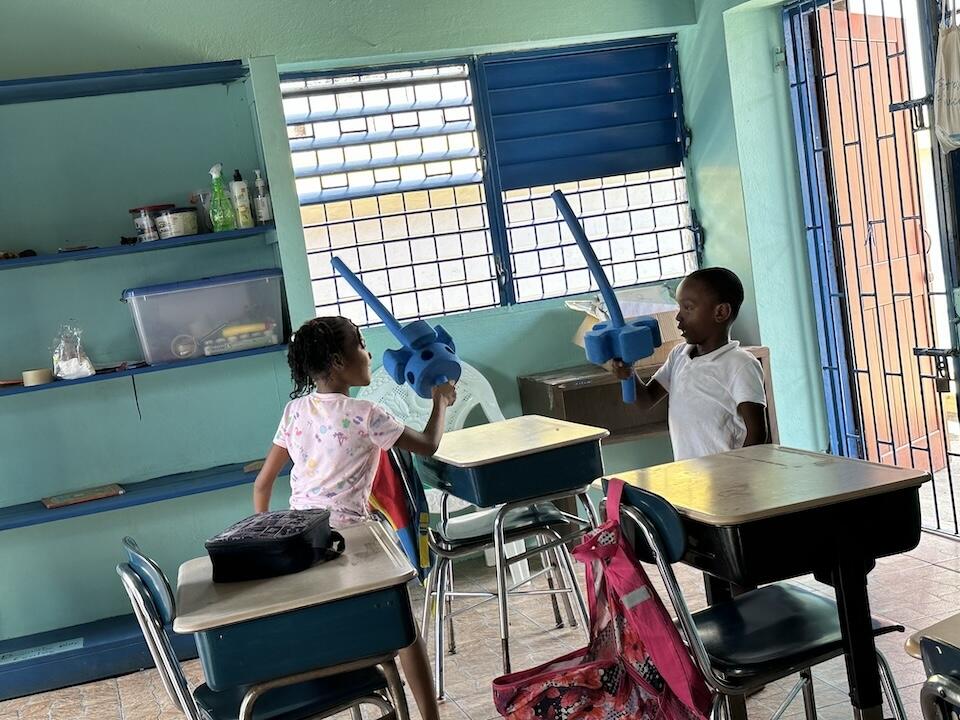
UNICEF Jamaica: helping children play and learn at home, at school and in their communities
As part of overall support to the Ministry of Education and Youth’s learning recovery and positive parenting efforts, UNICEF continues to work on inclusive, child-friendly teaching and learning. In 2023, UNICEF Jamaica launched Learning Passport Jamaica with support from Sony Group Corporation and other partners, along with the Accessible Digital Textbooks project, supported by the Eleva Foundation. The Learning Passport is a digital learning program that enables continuous access to play-based quality education, online, offline and on mobile devices, and in its first phase aims to enhance basic education. It includes teacher training and the close monitoring of participating schools to identify their best practices to inform scale-up.
UNICEF Jamaica also introduced two playful elements to drive traffic to the Learning Passport via QR codes on social media so the learning can continue at home: the now annual Summer Spark content accessed weekly on all @unicefjamaica channels from July through August, and Corner Shop Challenge posters distributed via social media and print across the island in partnership with the Digicel Foundation. The Corner Shop Challenge takes the game of I Spy to another level, reminding parents that playful learning opportunities are present everywhere, even on simple trips to the corner store. Watch the video to see the Corner Shop Challenge in action.
Give children around the world the gift of play by donating recreational supplies, art kits and more through UNICEF's Inspired Gifts program.
This story was originally published on unicef.org
HOW TO HELP
There are many ways to make a difference
War, famine, poverty, natural disasters — threats to the world's children keep coming. But UNICEF won't stop working to keep children healthy and safe.
UNICEF works in over 190 countries and territories — more places than any other children's organization. UNICEF has the world's largest humanitarian warehouse and, when disaster strikes, can get supplies almost anywhere within 72 hours. Constantly innovating, always advocating for a better world for children, UNICEF works to ensure that every child can grow up healthy, educated, protected and respected.
Would you like to help give all children the opportunity to reach their full potential? There are many ways to get involved.



